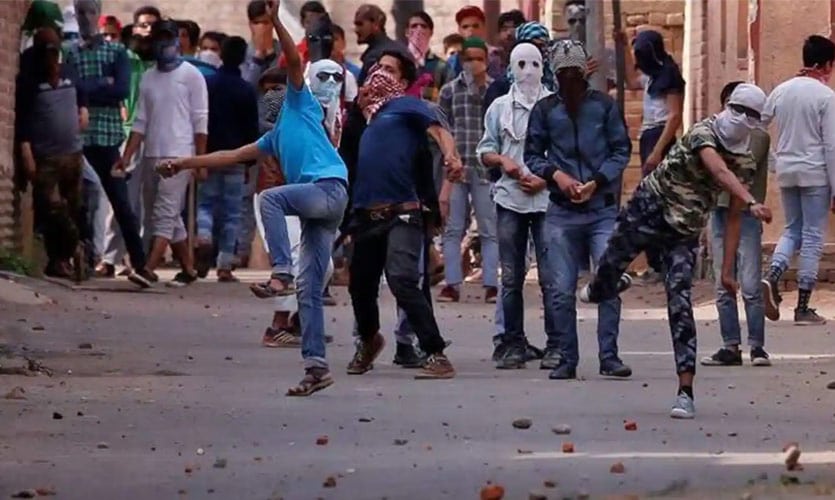The Criminal Investigation Department (CID) of the Jammu and Kashmir Police has directed that all persons participating in stone-pelting or subversive activities be denied security clearance required for passports and other government services.
CID’s Special Branch (SB) senior superintendent issued an order on Saturday directing all field units under his command to help ensure that the person’s involvement in law and order, stone-pelting cases and other crimes prejudicial to the state’s security are specifically investigated during “passport, service and any other verification related to government services/scheme”.
“The same must be corroborated from the local police station records,” the order read. For verification purposes, the senior superintendent stated that digital evidence such as pictures, videos and audio clips from CCTV cameras, and quadcopter images stored in the archives of police, security forces, and security organisations may also be used.
Previously, CID reports were required under an amendment to the Jammu and Kashmir Civil Services Verification of Character and Antecedents Instructions, 1997, according to a Hindustan Times report.
According to a report in the Indian Express, it is also mandatory to disclose whether a family member or close relative is affiliated with a political party or organisation, or has participated in any political activity, or has had links with a foreign mission or organisation, or any prescribed/prohibited/banned organisation such as the Jamaat-e-Islami.
Jammu and Kashmir police and the Indian security forces are subjected to stone-pelting attacks by the youth in Kashmir. The stone-throwers are called Sangbaaz, and “Kanni Jung” means battling with stones in Kashmiri.
Not only is stone-throwing widespread in the Kashmir Valley, but it is also becoming increasingly organised, with stone-throwing professionals reportedly available for hire to lead the way and then leave innocent young agitators exposed when security forces are forced to respond in order to bring the situation under control.
Stone-pelting used to be a popular way for young and hot-tempered people to vent their frustration. The Central Reserve Police Force (CRPF) personnel in Srinagar were routinely pelted with stones after Friday prayers at the Jama Masjid in Nowhatta, Srinagar.
The Pakistan Army’s publicity office (Inter-Services Public Relations) released an anthem for the “Sangbaaz” in 2017. The lyrics refer to the allegation that soldiers shoot rubber bullets into the eyes of the stone pelters to blind them, saying, “You can snatch out our eyes, but you cannot snatch our dreams.” Major General Asif Ghafoor, in a tweet, posted a video of the song, which honours stone-pelters as heroes striving for Kashmir’s freedom.
The Jammu and Kashmir police initiative to refuse security clearance to anyone “involved in acts detrimental to the security of the state, including stone-pelting,” is expected to affect thousands of youths. Estimates suggest that more than 20,000 people are protesting in Kashmir. More than being a deterrent to demonstrations and stone-pelting, the action will have a negative influence on the future of many young people who may have been part of stone-pelting or protests in the past. Similarly, the unavailability of a passport would make it difficult for them to leave the dire situations in search of work.
According to the Kashmir Observer, such actions in the past have made no difference to the issue. The administration could have done so by granting amnesty to those facing stone-pelting charges. Jammu and Kashmir state administrations have previously adopted a few strategies, for example, in 2017, former chief minister Mehbooba Mufti launched a series of initiatives aimed at reuniting the Valley’s highly divided residents. As part of the agreement, the youths imprisoned in 2016 for participating in rallies and throwing stones were promised rehabilitation services. Her government had also begun a review of the cases of ‘second-time offenders’ – youths who had been arrested more than once for anti-government protests or stone-pelting accusations. Around 10,000 persons had been granted amnesty at the time, with a significant majority of them in the age range of 15 to 20 years old. Many of them were boys or young adults.
Mainstream media, however, claimed the real story to be slightly different. India Today claimed that stone-pelters had been paid by certain separatist forces to protest in March 2017. Some confessed on camera in an interview that they are paid between ₹5,000 and ₹7,000 a month, as well as provided with clothes and shoes. A member of this group said that additional money is allocated for the production of petrol bombs. They refused to reveal the identities of the investors citing privacy concerns. Syed Ali Shah Geelani and Asiya Andrabi were among the Kashmiri separatist leaders who received money from Pakistan’s Inter-Services Intelligence (ISI), according to a report by the Indian Intelligence Bureau in April 2017. This money was reportedly used to pay off stone-pelters and petrol bomb-throwers, as well as to incite anti-Indian sentiment in the Valley.
Read more: Decoding The Assam-Mizoram Border Dispute
To quell the militancy and dissent in Kashmir, the central administration has adopted a hardline approach over the last two years. Fundamentally, the situation remains largely unchanged. This is where the need for outreach comes in. An effort to address alienation could create more goodwill for the government and a feeling of genuine peace on the ground.










